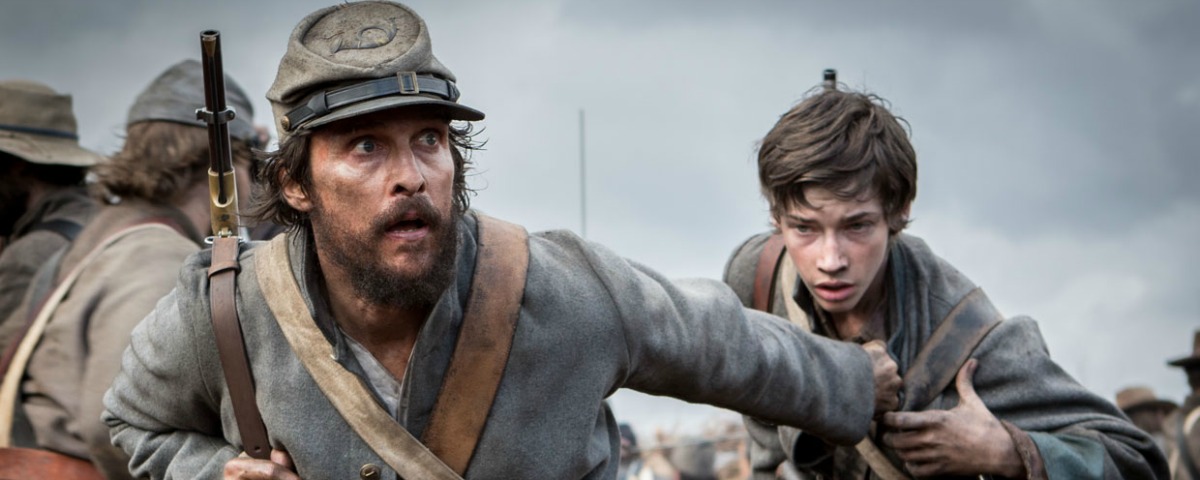Free State of Jones, STX Entertainment, 139 minutes, 2016
Presentism, introducing present-day ideas and perspectives into depictions or interpretations of the past, can infect the best efforts of movie-makers as well as historians. Gary Ross’ $50 million historical drama, sumptuously filmed and scrupulously researched, is a good example. That mistaken approach turns Free State of Jones into a 21st-century condemnation of racism, economic inequality and political manipulation. Thanks to his focus on making his film relevant, Ross has let the complexity of Newton Knight, the historical character on whose actions the story is based, slip away into the cyprus swamps of Jones County, Miss. Not even Matthew McConaughey’s earnest portrayal of Knight can dredge them up.
All that is not to say Ross has made a poor movie. He hasn’t. But Hollywood is the place where dreams are made and reality usually comes in a distant second. Keeping faith with historians in addition to film aficionados and the viewing public can be difficult. Ross seems to be reaching for a deeper understanding of the events he has brought to the screen. Exactly what that truth is has been the topic of critical discussion, some of it praiseworthy, some of it bitingly critical. But in the final analysis, this is a movie rather than a documentary, and can best be judged as a cinematic artifact, not a representation of reality.
Newton Knight is a subsistence farmer who never owned slaves and came from an area, Jones County in southern Mississippi, where anti-secession sentiment was unusually strong. Similar regions could be found elsewhere the South. Why he volunteered for the Army in July 1861 as a medical attendant is not clear. Why he deserted in October 1862 is. Knight’s motives stem from the mindless carnage he witnessed on the battlefield, the death of a youthful kinsman, and the Confederacy’s passage of the “20 Negro law”—enacted in the spring of 1862—that exempted anyone with 20 plantation slaves from serving in the Army. But the final piece falls into place when he comes home to bury a relative and sees Confederate home guardsmen appropriating the food, livestock and possessions of his struggling neighbors while sparing nearby plantations. Knight is then transformed into a man for all seasons—part Robin Hood, part Karl Marx, part Frederick Douglass and part John Brown.
McConaughey manfully shoulders all those personas, some more convincingly than others. Liable to be arrested and hanged as a deserter, Knight is spirited to safety by Rachel, a house servant who will eventually become his common-law wife. He finds refuge in a swamp encampment of runaway slaves. Unfortunately, Gugu Mbatha-Raw, playing Rachel Knight, comes across only as a faithful handmaiden, without sufficient personality to influence Knight’s evolution into a leader. Hunted by the law, bitten by a slave-catching hound and reduced to living on the run, Knight must share the fate of contrabands. Thus his education into Southern racial realities begins, helped by a sage slave prophetically named Moses Washington, played with wry intelligence by Mahershala Ali (Remy Danton from Netflix’s House of Cards). Knight, already disillusioned by the economic inequality of the war, gains empathy for men dispossessed because of the color of their skin, an insight that will underpin his actions for the rest of the film.
After the fall of Vicksburg in July 1863, Knight’s band of shadow warriors becomes an avenging army, as former Confederate soldiers—parolees as well as deserters—find sanctuary in a self-sufficient, integrated community being built far from the madness afflicting the surrounding countryside. Their excursions in search of food, clothing and guns brings them to the attention of local Confederate authorities. This allows Ross to introduce some brutal battle scenes. In a bid to protect the fledgling community, Knight proclaims the parts of three counties under his control “Free State of Jones.”
The end of the war does not bring peace. If the fighting bred violence and hatred, Ross portrays life during Reconstruction as even more brutal. Knight’s efforts to build an integrated school for his white and mixed-race children and lead his newly enfranchised African-American neighbors to the polls meet with a vicious response. While Knight’s actions might be interpreted as the result of a “white savior” complex, his motives spring from a deeper conviction that makes him what German philosopher Georg F. Hegel called a world historical figure. In the film, Knight declares, “You can’t own a child of God.” This sets him apart from the prevalent Southern Christianity of his day, which was based on white supremacy; minsters preached black compliance, while the Ku Klux Klan proclaimed itself a Christian organization.
Ross’ film is hampered by a subplot that breaks into the primary narrative several times. It concerns the miscegenation trial of Knight’s great-grandson, Davis Knight, in 1948 Mississippi. Though interesting, this part of the story could have been handled as an epilogue—or perhaps omitted altogether.
Viewers of Free State of Jones will come away with many different interpretations of the film. But no one is likely to come away unmoved.
– Gordon Berg





